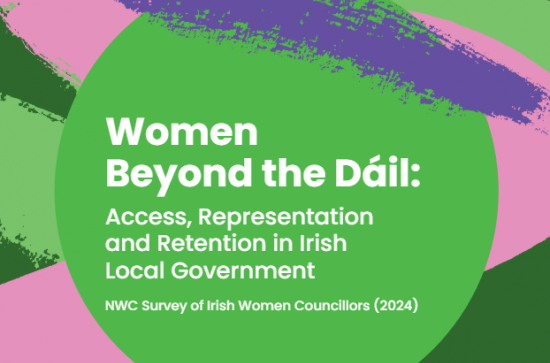
Women and minorities grossly under-represented at local level: NWC
Women’s representation at local level is stagnant at 26%
New research, commissioned by the National Women’s Council (NWC) and published today, finds that women and minoritised people are grossly under-represented in local politics. The organisation is calling for gender quotas at local level but says this is only part of the solution.
“Women Beyond the Dáil: Access, Representation, and Retention in Irish Local Government” examines the motivations and deterrent factors for women who served in local government between 2019-2024. Researchers Pauline Cullen (Sociology Department, Maynooth University) and Claire McGing found that issues such as gendered abuse, low pay, and care responsibilities all influenced women’s decisions to whether to put themselves forward for re-election.
Launching the report, Minister of State for Local Government and Planning Alan Dillon, said:
“While it was encouraging to see a record number of women candidates, including women from all backgrounds, contest the recent local elections - 681 female candidates on the ballot - and an increase in the number of women councillors elected from 2019. However, there is no room for complacency and I believe that we have much more to do. Indeed, despite some progress, it is important now, more than ever, to support women who are interested in entering politics. This Government is committed to addressing that imbalance.”
“To do that work, we need to understand the obstacles and challenges ahead of us. I would like to congratulate the NWCI, Pauline Cullen and Claire McGing on this important and timely research. The experiences and perspectives of sitting women councillors, and their reasons for choosing to run or not run again in the 2024 elections, are crucial to understanding and addressing the barriers which affect women’s participation in local government. My officials and I will carefully consider the findings of this research as we work with stakeholders – including the NWCI - towards ensuring that we can have representation at local Government level which reflects the society that we are.”
NWC Head of Campaigns and Mobilisation Rachel Coyle said:
“It was disappointing in the local elections that the two largest parties ran less than 30% women candidates. This played out in the amount of women who got elected, despite record numbers of women running for election. We’ve got gender quotas at the national level, and they have worked, so now let’s see them at local level.”
Co-author of the report Claire McGing said:
“One of the main reasons that women do not stay in politics once they have been elected is the online and offline abuse they face and the safety concerns this raises. There can often be a lack of support around this.
Many women councillors also work a ‘triple shift’, juggling care responsibilities and paid employment with their political work. The low remuneration associated with the role also disproportionately affects women and minority communities, as they are more likely to be economically disadvantaged in the first place”.
Pauline Cullen, co-author of the report, said:
“Despite the many gendered pressures on them, women councillors show real resilience and perseverance in putting themselves forward for election. Many women councillors found women’s caucuses to be supportive.
Other research has found that co-option can be excellent entry route into politics for women, as it overcomes the barrier of women’s invisibilised contribution to their communities. We recommend women-only shortlists for co-option to immediately address the gender imbalance at local level.”
“Women Beyond the Dáil: Access, Representation, and Retention in Irish Local Government” is in follow-up to NWC’s 2019 Beyond the Dáil report. Alongside recommendations on gender quotas and co-option, the report also recommends broadening party selection processes, financial support for women, and returning election expenses if candidates meet a percentage of the quota.
What: Women Beyond the Dáil: Access, Representation and Retention in Irish Local Government
When: Tuesday 25th July 2024, 11am
Where: The Boardroom, Buswells Hotel, 23 Molesworth Street, Dublin 2 (D02 CT80)
For comment: Rachel Coyle, Claire McGing and Pauline Cullen
Find here the full report: https://www.nwci.ie/images/uploads/NWC_Women_Beyond_the_Dail_2024.pdf
See also: https://www.irishexaminer.com/opinion/commentanalysis/arid-41421664.html
For more information, please contact Sinéad Nolan, NWC Communications and Social Media Coordinator, 085 8619087 or [email protected]
Notes:
About NWC
The National Women’s Council is the leading national representative organisation for women and women’s groups in Ireland, founded in 1973. We have over 190 member groups and a large and growing community of individual supporters.
The ambition of the National Women’s Council is an Ireland where every woman enjoys true equality and no woman is left behind. This ambition shapes and informs our work, and, with our living values, how we work.
We are a movement-building organisation rooted in our membership, working on the whole island of Ireland. We are also part of the international movement to protect and advance women’s and girls’ rights. Our purpose is to lead action for the achievement of women’s and girls’ equality through mobilising, influencing, and building solidarity. Find out more on www.nwci.ie .
